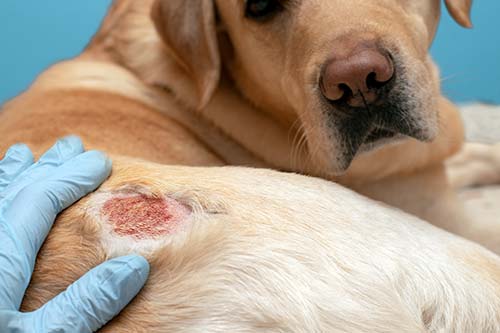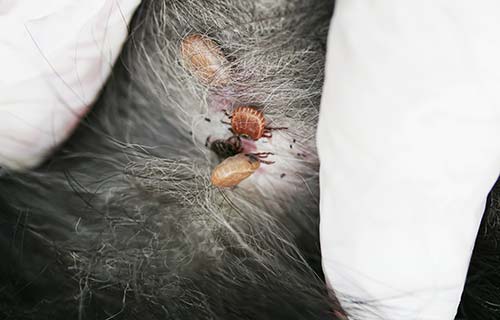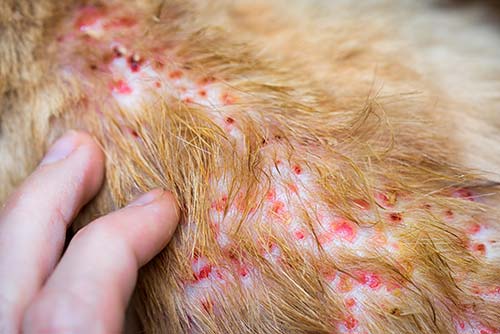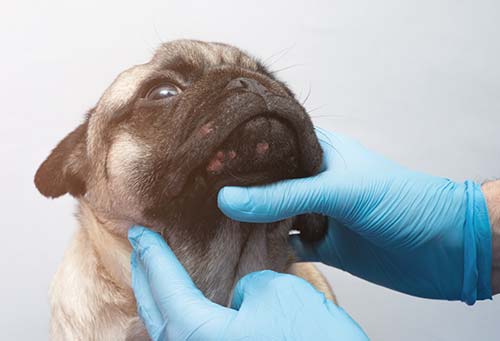
Dog skin infections are a common issue that many pet owners encounter. These infections can be caused by various factors, including allergies, fleas, mange, bacterial or fungal overgrowth, and more. Identifying the underlying cause is crucial for effective treatment and recovery.
In this article, we will discuss when you can treat a skin infection at home, and when to call your veterinarian for help.
Does your dog have a skin infection? Most common Signs
Your dog may exhibit some of the following symptoms if they have a skin infection:
- Redness
- Itchiness and/or hair loss
- Oozing skin with pus-like discharge that may be yellow or green and may be foul smelling
- Rashes
- Bumps or pimples
- Crusting or scaling
- Pain or discomfort
- Excessive licking or scratching
- Foul or unpleasant smell
Your dog may develop a localized infection, or it may spread to large areas over the body. Skin infections may be caused by a variety of microorganisms and may have various underlying conditions. It is advisable to visit a vet if your dog develops a skin infection for the first time to evaluate your dog for underlying issues and to identify the cause of the infection to receive the appropriate treatment.
When you can try home remedies
Recovery may be quick and simple if the infection is localized and uncomplicated. Below is an example of a small, localized area of skin infection that may respond to home treatment but may need veterinary treatment if it doesn’t improve.

In more complicated cases it can take weeks to months of veterinary supervised treatment for your dog to recover from the skin infection. They may need chronic treatment to treat underlying infections to prevent flare ups. Below is an example of an extensive skin infection that needs veterinary assistance to heal quickly:

Some dogs develop infections due to severely antibiotic resistant bacteria. These infections can be very difficult to treat and may need lengthy treatment periods.
Home remedies for dog skin infections
As a pet owner it is very difficult to distinguish between the various causes of skin allergies. The only way to be sure of what the cause of the allergy is, is for a veterinarian to do a variety of tests. Here is some general advice as to what home remedies can be tried:
Parasite treatment
Make sure your dog’s flea preventative treatment is up to date. Avoid using a dip as this may irritate the skin. Rather use a veterinary approved topical (“top spot”) or oral formulation to control fleas.

Ticks, fleas and mites can cause skin irritations.
Cleaning with an antiseptic
If the area is small and the infection is mild, an over-the-counter antiseptic can be used. Products containing chlorhexidine or iodine are generally safe for use. Make sure that the product is made specifically for dogs as some antiseptics can be toxic to dogs. Do not use them if the wound is very deep. If the infection is deeper than just the skin layer then veterinary supervision is required.
Pet Honesty Chlorhexidine Dog Shampoo
If you don’t have an antiseptic, then saltwater bathing can be helpful. Add approximately half a teaspoon to lukewarm water and clean the affected area 1-2 times a day.
Hypoallergenic shampoo
Using a mild, hypoallergenic shampoo can bring some relief to the infected skin. Be sure to choose a shampoo formulated specifically for dogs.
Pet Honesty Dog Allergy Relief Anti-Itch Shampoo for Dogs and Cats
Pro Pet Works Oatmeal Dog Shampoo & Conditioner

Grooming
If the fur is matted or dirty, then a good grooming is recommended to treat the infection. Clip the hair away from the infected area to ensure that the antiseptic and/or shampoos can reach the skin.
Other home remedies
Many sources advise using substances such as apple cider vinegar, coconut oil, aloe vera or hydrogen peroxide. These may be useful in some circumstances but may also worsen the condition or cause an irritation or allergic reaction if your pet is sensitive to it. It is better to use dog-specific formulations and avoid other home remedies.
How to decide on home remedies vs. vet visit
Before attempting any home remedies for your dog’s skin condition, it is advisable to consult with a veterinarian. The information provided here is for informational purposes only and should not replace professional veterinary advice, diagnosis, or treatment.
Every dog’s skin condition is unique, and what works for one dog may not be suitable for another. A veterinarian can accurately diagnose the cause of the skin issue and provide guidance on the most appropriate treatment plan.
Attempting home remedies without proper knowledge and guidance can potentially worsen the condition or delay effective treatment. Always prioritize your dog’s health and well-being by seeking professional veterinary care when needed.
Determining whether to try a home remedy or consult a vet depends on several factors
Severity
If the symptoms are mild and your dog seems comfortable and is not showing any other symptoms, then home remedies may be worth trying. If the skin infection is severe, widespread, or worsening or if they are displaying any other symptoms of illness, it is better to visit a vet.
Duration
If the infection lasts longer than two to three days or if there has been no improvement, then it is best to take your dog for a consultation with a vet.
Previous History
If your dog has a history of chronic skin issues or allergies, you might have received some treatment from your vet and advice on how to manage a flare up of your dog’s skin condition. Be sure to follow your vet’s advice closely. If your pet has never had a skin infection before, a vet visit is advisable to determine the underlying conditions.
Key signs and symptoms to keep an eye on if your dog as a skin infection
If your dog’s skin infection does not improve in 2-3 days then it is a cause for concern. If it is worsening or the affected area is getting larger then a vet visit is advisable. If your pet is distressed or constantly licking or scratching at the area, they may need systemic treatment to resolve the infection.
If your pet is showing any other symptoms of illness, e.g. lethargy or lack of appetite, then home treatment should not be attempted. They may be seriously ill, and they need a veterinary examination.
If any of your other animals or family members are showing similar skin infections symptoms, then a vet visit is advised to treat the infection quickly to prevent further spread of the contagious infection.

A severe skin infection that needs urgent veterinary attention.
The importance of veterinary treatment
Any skin infection can be caused by a variety of different micro-organisms or other factors such as allergies or autoimmune conditions. Getting prompt veterinary treatment will get to a diagnosis quicker and this will get your pet the help and relief that they need quicker.
Only a veterinarian, using a variety of diagnostic tests, will be able to tell what the cause of the infection is. It is almost impossible to diagnose the cause of the infection just by looking at the skin. Using several types of home remedies and trial and error approach may worsen the condition, making it costlier and more difficult to treat in the long run, and delaying your dog’s discomfort.

When NOT to try home remedies
Do not attempt home remedies if:
- Your pet has never had a skin condition before. Any new condition is concerning and should be thoroughly checked out.
- Your pet’s skin condition is severe or getting worse.
- Your dog is in pain or distress.
- Your dog is showing any other symptoms of illness.
- Your dog has a large area of skin affected or if there are deep wounds or abscesses.

A deeper wound that should be examined and treated by a veterinarian.
Frequently Asked Questions
Are there any home remedies that I should avoid?
Avoid using any substances that have not been tested on animals. There are some ingredients that may be toxic or may worsen the conditions. Some substances such as apple cider vinegar or hydrogen peroxide can burn the skin and can cause severe discomfort.
Are there any over-the-counter products that can help?
Yes, hypoallergenic shampoos and antiseptic washes may help to control the infection. Always be sure to check that they are formulated specifically for dogs. Read and follow the package instructions accurately to prevent complications. It is always best to consult your vet for specific recommendations. If the infection is mild and a vet is not readily available, consider a teleconsultation for accurate advice that is specific to your pet.
Are skin infections contagious to other pets and humans in the household?
Yes, in some cases they can be contagious. If your dog has ringworm this can spread to others in the household. Certain bacteria and parasites may also spread to other family members. It is for this reason that prompt diagnosis and treatment is advised.
Disclaimer: This website's content is not a substitute for veterinary care. Always consult with your veterinarian for healthcare decisions. Read More.


Be the first to comment